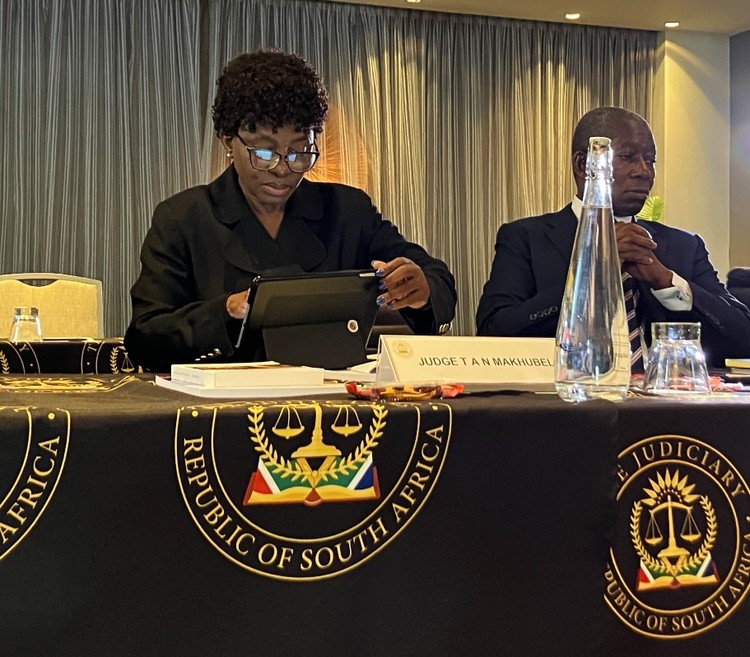
22 February 2023
Judge Tintswalo Annah Nana Makhubele, accused of gross misconduct by activist group #UniteBehind, at the second day of hearing at the Judicial Conduct Tribunal. Photo: Masego Mafata
The State has suffered “financial prejudice” following the suspension of Judge Tintswalo Annah Nana Makhubele, says Judge President Dunstan Mlambo of the Gauteng Division of the High Court.
“We have had to appoint acting judges to do her work and she has continued to get her salary,” Judge Mlambo said in testimony at the Judicial Conduct Tribunal against Judge Makhubele on Wednesday. The hearing into Judge Makhubele’s alleged misconduct entered its second day in Rosebank. This comes almost three years after the Tribunal was recommended by the Judicial Conduct Committee (JCC) in March 2020.
According to Judge President Mlambo, both Judge Makhubele and a judge acting in her position have been paid since her suspension in 2020. Judge Makhubele will remain suspended from the High Court, pending the conclusion of the Tribunal.
The Tribunal follows activist group #UniteBehind’s complaint against Judge Makhubele with the Judicial Service Commission (JSC) in 2018. In the complaint, the activists accuse Judge Makhubele of holding the position of a High Court judge, from 1 January 2018, while at the same time serving as chairperson of the Passenger Rail Agency of South Africa’s (PRASA’s) interim board, from 19 October 2017 to 16 March 2018. This, #UniteBehind argue was in breach of the separation of powers principle. They further accuse Judge Makhubele of improper conduct while she was chairperson of PRASA.
During cross-examination of the witness, advocate Vincent Maleka, representing Judge Makhubele, maintained that her conduct was not “prejudicial to the independence of the judiciary” from January to June 2018.
Maleka argued that Judge Makhubele was not a judge of the High Court “in active service” at the point at which she served as PRASA interim board chair. He said Makhubele only assumed her duties as a judge on 1 June 2018, after she had left her position at PRASA in March of that year.
Maleka and Judge President Mlambo debated about when Judge Makhubele was supposed to declare “registrable interests” that would impact her ability to fulfil her role as a judge in the High Court. Maleka argued that Judge Makhubele was only expected to declare “registrable interests”, which include her position at PRASA, once she took office as a judge.
Judge President Mlambo disagreed, saying that appointed judges had a duty to “disclose” any interests or information affecting their suitability to serve as judges when they learned of their appointment, not when they assumed office. He said Judge Makhubele knew about her appointment as a judge in November 2017, and it was only in the middle of January 2018 that she confirmed her position at PRASA with him, after he had to “extract” it from her.
Judge President Mlambo said that if he had been aware of Judge Makhubele’s position at PRASA prior to her appointment as a judge, he would have alerted the JSC so that they could “grapple with this relevant factor and decide whether they revisit their recommendation of Judge Makhubele for appointment”.
Following Judge President Mlambo’s cross-examination, the Tribunal’s evidence leader, advocate Elaine Zungu, said she has decided not to call Deputy Judge President Aubrey Ledwaba of the Gauteng Division of the High Court, who was due to appear before the Tribunal on Wednesday.
The Tribunal adjourned for the day and is set to resume at 10am on Thursday.